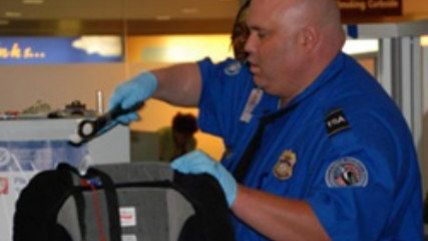Airport Lines and the TSA: Your Government Is Failing You
We're not any safer, just more miserable.


This summer, air travel is for people who expect to go to hell and want to know what it will be like. Security lines have reached epic lengths in many airports. Thousands of travelers have missed flights. And the Transportation Security Administration now advises passengers to arrive two hours before departure for domestic flights—and three in some places.
The agency in charge of aviation security has become a major problem. That's odd, because it was supposed to be a solution. Nearly 15 years after it was created, it's a case study of how firm, well-intentioned government intervention can produce an exploding cigar.
The agency came into being because of the 9/11 attacks, carried out by terrorists who commandeered airliners. A large share of the blame was heaped on airport security firms that didn't intercept the hijackers.
This lapse was not merely the failure of the workers manning the X-ray machines at the nation's airports. It was, we were told, a failure of the private sector, which was responsible for screening—and the only reliable way to prevent future attacks was to turn security over to the federal government.
A few weeks after the attacks, House Democratic leader Richard Gephardt took the House floor to lament the existing system. "The companies that have been doing this have failed the American people," he declared. "We must put security in the hands of law enforcement officers."
His was a common sentiment. Private contractors, we were told, paid their screeners too little, hired employees without adequate background checks and sometimes missed weapons being taken through checkpoints. When Republicans argued for keeping these operators but monitoring them better, Sen. Ernest Hollings, D-S.C., scorned the idea: "We've had private contractors with government supervision in the past, and we ended up with 5,000 dead."
It wasn't exactly fair to blame the screeners for 9/11. The knives and box cutters reportedly used by the hijackers were not prohibited at the time. The 9/11 Commission faulted the Federal Aviation Administration because its policies "were aimed at keeping bombs out of baggage, not at keeping planes from being turned into guided missiles." Flight crews were trained not to resist hijackers—which made it easy for the terrorists to take over the planes.
In spite of all that, Congress insisted on establishing the TSA, which today has some 55,000 employees, an annual budget of $7.44 billion and an aversion to self-criticism.
Explaining the recent mammoth delays, it said, "Individuals who come to the TSA checkpoint unprepared for a trip can have a negative impact on the time it takes to complete the screening process." Administrator Peter Neffenger said he was sorry about the people stranded in Chicago last weekend but added, "I won't apologize for doing our job well."
No need, since that accusation has not been heard. The delays would be easier to bear if screeners were relentlessly proving their value. But last year, in an investigation by the Department of Homeland Security's inspector general, undercover agents got banned items past screeners in 95 percent of their attempts.
"After spending over $540 million on baggage screening equipment and millions more on training, the failure rate today is higher than it was in 2007," complained Jason Chaffetz, chairman of the House Oversight and Government Reform Committee. "Something is not working."
Actually, more than one thing is not working. The agency's culture also undermines safety. "Dozens of Transportation Security Administration employees in recent years have been reassigned, demoted, investigated or fired for reporting lapses or misconduct by senior managers, charges that were later upheld by whistle-blower protection agencies," The New York Times reported last month.
One remedy the agency offers for the recent long lines is for the airlines to stop charging for checked bags, which would mean fewer carry-ons to be inspected. Nice of the TSA to suggest that someone forgo revenue for the greater good, but it hasn't proposed to do the same—say, by waiving the $85 PreCheck fee to induce more people to sign up for expedited screening.
Even that option might not help, because the agency is already having trouble keeping up with applications. If you want an appointment at one of the Chicago-area sites, expect to wait until July.
One advantage of using private companies to do airport screening is that if they make a botch of it, you can fire them. What would it take for the TSA to get fired?
© Copyright 2016 by Creators Syndicate Inc.


Show Comments (30)